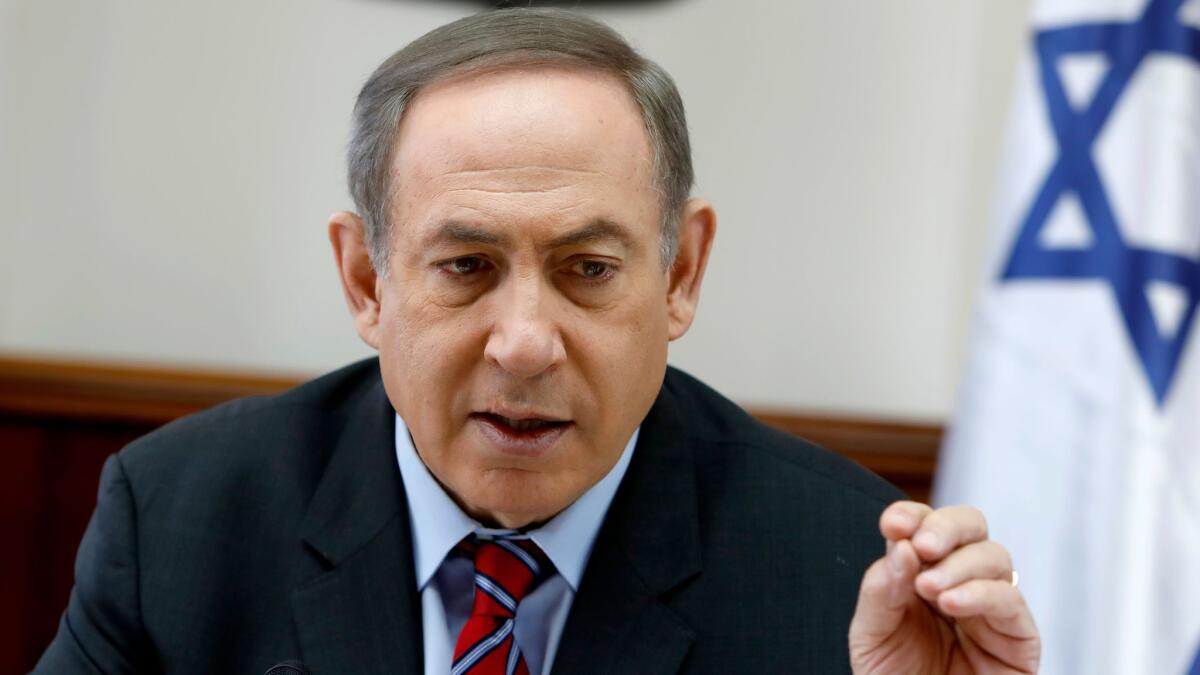Israel approves settlement deep in the West Bank for the first time in two decades but pledges future controls

- Share via
Reporting from Tel Aviv — Israel’s move to approve a new settlement deep in the West Bank brought international condemnation Friday, even as the government was bending to pressure from the Trump administration to limit the footprint of future settlement building.
The decisions drew a furious reaction from Palestinians, who said the move could destroy any chance for peace in the region.
United Nations Secretary-General Antonio Guterres was “disappointed and alarmed” about Israel’s decision to authorize the first new government-approved settlement in more than two decades.
The Israeli security cabinet approved the new settlement late Thursday, following up on a promise to residents of the illegal hilltop outpost of Amona before they were evacuated in February under an order from the Supreme Court. The cabinet also advanced construction tenders from 2,000 new homes and declared 250 acres of the West Bank as state land.
“We promised and we made good on it,” said Ofir Akunis, a lawmaker from Prime Minister Benjamin Netanyahu’s Likud party.
But Netanyahu’s government also said that in response to President Trump’s positions it would limit new construction in the more than 100 existing settlements to those areas already built.
The decisions allow Netanyahu to give his pro-settlement constituents a victory, while containing ideologues who seek unrestrained settlement growth and annexation, moves which would isolate Israel abroad, said Ofer Zalzberg, an analyst for the International Crisis Group.
“The way in which this has both limitations and achievements for the settlers allows Netanyahu to avoid overreach in terms of having Trump serve as the pretext for avoiding annexation,” Zalzberg said, “and at the same time not being labeled as Leftist by the settlers.’’
Meanwhile, Palestinian officials in the West Bank said that U.S. acceptance of the new settlement could undermine any attempts by the Trump administration to revive peace negotiations, which have been moribund in recent years.
“The fact they are coming now and saying they are building a new settlement, is a sign that Netanyahu is very confident, and doesn’t think that there’s anyone abroad who will stop him,” said Xavier Abu Eid, an advisor to the Palestine Liberation Organization’s Negotiations Affairs Department.

Palestinians and much of the international community consider all Israeli building in the occupied West Bank and East Jerusalem as illegal. The United Nations, the U.S. and European countries have warned that settlement expansion was rapidly endangering prospects for peace through a two-state solution for Israelis and Palestinians.
Guterres “condemns all unilateral actions that, like the present one, threaten peace and undermine the two-state solution,” the U.N. said in statement Friday.
Federica Mogherini, the European Union’s High Representative on Foreign Affairs, said in a statement the decision to establish a new settlement threatens “to further undermine prospects for a two state solution, which remains the only realistic way to fulfill the aspirations on both sides.”
During the Obama administration, Israeli settlement building was a sore point of contention. Trump, who has said Netanyahu should hold off on the expansion of settlements, pledged during his campaign to avoid public criticism of Israel.
“All Israeli settlements are illegal and we are not going to accept any formula that aims at legitimizing the presence of Israeli colonies on occupied Palestinian land,’’ Saeb Erekat, the chief Palestinian negotiator, said in a statement.
“Israel enjoys a culture of impunity that allows it to strengthen its apartheid regime in Occupied Palestine,” Erekat said. “We send a clear message to the U.S. Administration, the United Nations and to the European Union: Peace is not going to be achieved by tolerating such crimes.”
The new settlement — to be called “Geulat Zion” — is planned for an empty hilltop about two miles east of Shilo, a remote Israeli settlement deep in the West Bank.
Israel’s Peace Now organization — an opponent of settlement expansion — said it’s the first time since 1991 that Israel’s government has decided to establish a settlement in such a far-flung spot.
In a statement, Peace Now said the new settlement would be “strategic for the fragmentation of the West Bank” because it would join a series of Israeli towns that effectively would prevent the establishment of a contiguous Palestinian state.
The group alleged that Netanyahu’s new policy of settlement restraint contained loopholes that would enable the government to continue building if it wanted.
Israel and the Trump administration have been negotiating a joint approach to West Bank settlements over the last few weeks, with Trump’s negotiations envoy, Jason Greenblatt, and Netanyahu devoting two March meetings to settlements.
Greenblatt also met with Palestinian Authority President Mahmoud Abbas twice in March to discuss the peace process.
Following the settlement announcement, a White House statement said that “further unrestrained settlement activity does not help advance peace’’ but expressed understanding that the new settlement was part of a commitment made to Amona evacuees before Trump called for restraint.
“Going forward . . . the Israeli government has made clear that Israel’s intent is to adopt a policy regarding settlement activity that takes President Trump’s concerns into consideration,’’ the statement said.
Settler leaders hailed Israel’s decision to establish a new settlement, but expressed concern that the government had not set a timetable for the beginning of construction.
Betzalel Smotrich, a legislator from the pro-settler Jewish Home party, tweeted the decision on Geulat Zion represented a “breakthrough” but also cautioned that the restraints on building amount to a “freeze” in the West Bank.
“The Right claims the government decided in favor of construction. The Left claims it’s a freeze,” Smotrich wrote. “Regretfully, the Left wing commentators are correct. The right is willfully blind.”
Mitnick is a special correspondent.
More to Read
Sign up for Essential California
The most important California stories and recommendations in your inbox every morning.
You may occasionally receive promotional content from the Los Angeles Times.










